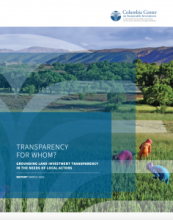Land Library
Bienvenido a la biblioteca de Land Portal. Explora nuestra amplia colección de recursos de acceso abierto (más de 74.000), que incluye informes, artículos de revistas científicas, trabajos de investigación, publicaciones revisadas por pares, documentos jurídicos, vídeos y mucho más.
/ library resources
Showing items 1 through 9 of 4922.June 4, 2021 -- An increasing number of countries are facing growing levels of acute food insecurity, reversing years of development gains.
New research by CCSI and the Centre pour l’Environnement et le Développement (CED) on transparency of land-based investment in Cameroon.
In the report, CCSI and CED find that:
Transparency is often seen as a means of improving governance and accountability of investment, but its potential to do so is hindered by vague definitions and failures to focus on the needs of key local actors.
Strong evidence indicates that the Brazilian government is taking advantage of the confusion caused by the Covid-19 pandemic to speed-up a wide-ranging environmental setback.
Landscape and Street Photographers use Neutral Density (ND) Filters to enhance their photos, drones images with advanced photogrammetry software produce high-resolution orthomosaic for the production of land use maps.
For two decades, increasing concerns about urban sustainability have driven Australian metropolitan planning efforts to call for fundamental changes to existing urban forms. These changes are intended to develop more compact cities characterised by a poly-nodal network of dense activity centres.
This note proves recommendations for governments, international actors, and mining advocates who seek to optimize the value of green energy mineral reserves, to ensure that expectations for green energy materials do not replace careful planning, impact assessment, and allocation of risks, as well
Over the past 30 years, real GDP in Ghana has more than quadrupled, and in 2011 the country joined the ranks of Lower Middle-Income Countries (LMICs).
In May 2019, a complaint was lodged with CAO by members of 22 communities from the Margibi and Bong Counties in Liberia (the “Complainants”), supported by the NGOs Green Advocates International (GAI), Alliance for Rural Democracy (ARD), Natural Resource Women Platform (NRWP), and the Yeagbamah Na






